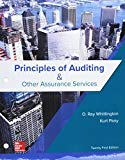
Explain the events that led to the crisis of credibility in late 2001 through 2002.
Explanation of Solution
Accounting professional:
An accounting professional is a person who performs the accounting tasks like preparation of the financial statement, analysis of the financial statement, audit, and more.
Crisis of credibility:
Crisis of credibility refers to the situation when the investor is not relying on the credibility of the company’s financial information.
The events that led to the crisis of credibility in late 2001 through 2002:
Following are the events that led to the crisis of credibility in late 2001 through 2002:
In December 2000, Company E acknowledged the accounting irregularities and filed the bankruptcy. Shortly after, Company W committed accounting fraud to increase the profit in its financial statements.
Other than these two main cases, there was immense number of cases of accounting fraud. This series of cases led to the crisis of credibility among the investors. Investors and financial professionals were no longer relying on the financial statements of the company to evaluate their financial health.
Thus, the frauds committed by the companies led to the crisis of credibility because the financial professionals were not relying on the credibility of the financial statements of the companies.
Want to see more full solutions like this?
Chapter 1 Solutions
GEN COMBO LL PRINCIPLES OF AUDITING & OTHER ASSURANCE SERVICES; CONNECT AC
- Hi expert please help me this questionarrow_forwardI need help finding the accurate solution th this general accounting problem with valid methodsarrow_forwardIn 2022, Rolling Mills, a producer of organic oat flour, had the capacity to produce 12,000,000 pounds of product at a conversion cost per pound of $0.18. The conversion cost per pound was $0.14 in 2021 (the previous year). The direct material cost per pound for both years was $0.09 per pound. In 2022, Rolling Mills produced 10,500,000 pounds, while actual production for the previous year was 9,200,000 pounds. What was the cost of unused capacity in 2022?arrow_forward
- Business/Professional Ethics Directors/Executives...AccountingISBN:9781337485913Author:BROOKSPublisher:Cengage
 Financial Reporting, Financial Statement Analysis...FinanceISBN:9781285190907Author:James M. Wahlen, Stephen P. Baginski, Mark BradshawPublisher:Cengage Learning
Financial Reporting, Financial Statement Analysis...FinanceISBN:9781285190907Author:James M. Wahlen, Stephen P. Baginski, Mark BradshawPublisher:Cengage Learning - Principles of Accounting Volume 2AccountingISBN:9781947172609Author:OpenStaxPublisher:OpenStax College



